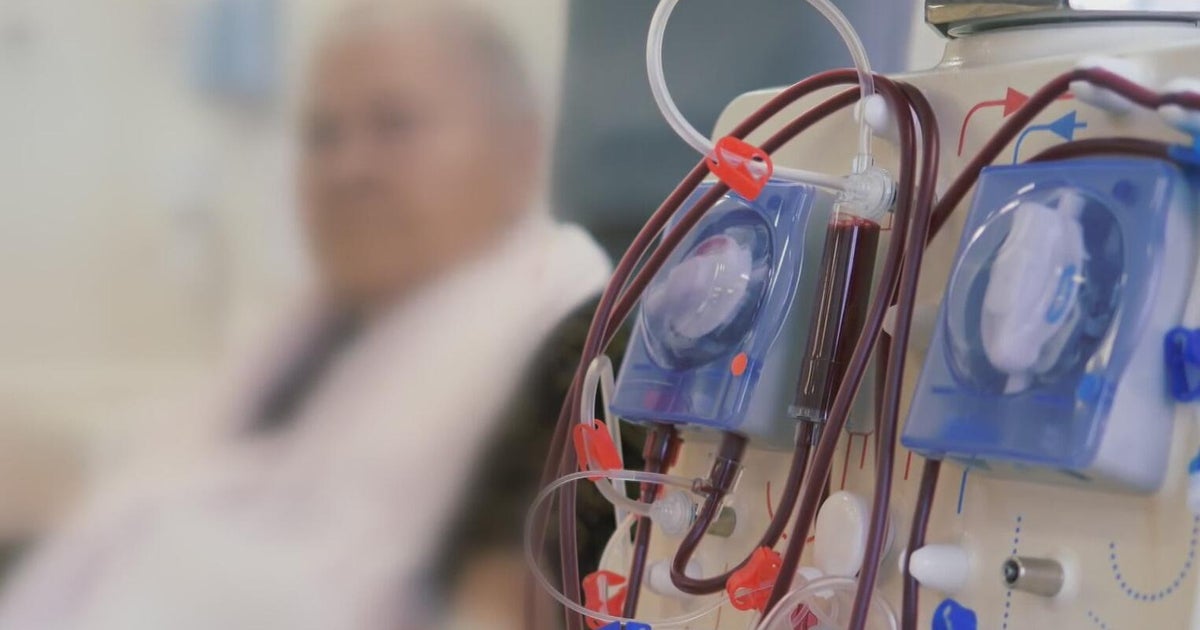Death rates for U.S. kidney dialysis patients are among the highest in the industrialized world. A CBS News Data Team investigation has found that one-third of the nation’s dialysis clinics have failed to meet federal performance standards.
In Texas, where the number of dialysis centers is higher than in any other state, the I-Team discovered that the problem is especially severe.
Texas ranks 13th nationwide for clinics with federal penalties, and North Texas has one of the highest penalty rates in the state, just behind Houston.
Any dialysis clinic that scored below a 55 out of 100 points across several performance measures received a financial penalty. The lower the score, the more the Centers for Medicare and Medicaid Services (CMS) docks their funding.
Patient describes fall
For 65-year-old Mittie Sampson, every dialysis session now brings fear.
“I’m very scared,” she said. “Since I’ve fallen, my anxiety is bad.”
Sampson said the fall that changed her life happened inside a Fresenius clinic near Houston. She claims a technician left her alone in the bathroom, even though she said, the staff knew she was a high fall risk.
“When they saw that I had fallen,” she recalled, “they put me back in the wheelchair and took me back to finish.”
Hours later, doctors discovered she had fractured both ankles and needed surgery.
“I’ll have this scar on my ankle for the rest of my life,” she said.
Sampson is now suing Fresenius, one of the largest dialysis providers in the country.
The company told the CBS News Texas I-Team it “denies the allegations in the complaint.”
“I have my daughter, even my little granddaughter helps,” Sampson added.
“She’s only 10, but she helps a lot. But this has really shaken me.”
“Fast food dialysis”
Other patients told CBS News that clinics meant to sustain life are putting them at risk.
Without dialysis, “I would die within three days,” said Jeff Park, a dialysis patient who now gets at-home care. “They’re interested in keeping the revenue streams flowing… moving us in like cattle. Get that patient out and the next patient in.”
Park described finding blood stains on chairs and floors that hadn’t been cleaned.
“They’re too busy,” he said.
A CBS News investigation found that since 2013, U.S. dialysis clinics have been cited for more than 115,000 deficiencies. The deficiencies range from unsanitary conditions to inadequate staff training.
Two-thirds of those deficiencies were found at facilities owned or operated by Fresenius or DaVita — the two largest dialysis corporations in the country.
Is the system dominated by 2 companies?
“These two companies have almost 80% of the facilities across the country,” said Ryan McDevitt, a researcher who coauthored a study on the dialysis industry.
“They have a classic case of a duopoly where they control the market. It’s a pure volume business … get as many patients through as possible.”
In North Texas alone, DaVita operates 49 clinics and Fresenius runs 55. Together, they control about 61% of the market.
CBS data analysis found that a DaVita clinic at UT Southwestern in Dallas has one of the highest penalty rates in the region, with more patient readmissions and hospital stays than expected.
Both companies declined on-camera interviews but provided written statements to the I-Team:
Statement from Fresenius Medical Care
“We deny the allegations in the complaint and are vigorously defending both our staff and the care that was provided. Our teams remain focused on delivering safe, high-quality care and improving outcomes for the patients we serve. By any objective measure, our ability to hire qualified staff, deliver best-in-class patient care, and innovate for the betterment of people living with kidney disease far outpaces the industry.”
Statement from DaVita:
“For more than 25 years, DaVita has committed to providing high-quality kidney care and improving lives—one patient, one community at a time. From neighborhoods across Texas to centers in 15 countries, our experience drives innovation and allows us to support communities in need. This commitment to Texas communities is reflected in our Community Health Experience, an initiative that brings free health screenings and education to under-resourced neighborhoods. We believe in accessible, life-sustaining care for all and a comprehensive approach to clinical performance.”
“Right now, the system is broken”
McDevitt said many physicians feel unable to speak out.
“Right now the system is broken,” he said. “They don’t really have a choice.”
Sampson says neither do patients. Filing a lawsuit wasn’t her plan.
“I really didn’t want to do that,” she told CBS. But she hopes her case forces clinics to take accountability.
“For anybody that has been hurt by these facilities — not assisting them where they need help — they should open their eyes,” she said. “I hope that’s what this does.”
Penalties across Texas
The CBS News Texas Data Team found that 72 of 170 dialysis clinics in the Dallas–Fort Worth area, 42%, were penalized for poor performance across key quality and safety measures, such as patient safety and hospitalizations.
Just over a third (35.8%) of dialysis clinics (264) in Texas were penalized by the federal government this year, flagged for poor performance across key quality and safety measures, such as patient safety and hospitalizations, so CMS docked their funding.
North Texas clinics with the steepest number of penalties
Children’s Medical Center Dialysis Unit, Dallas
Cook Children’s Medical Center Dialysis Unity, Fort Worth
- Response: “Our pediatric dialysis program delivers specialized, high-quality care, evidenced by both our strong internal quality metrics and positive patient and family satisfaction.
We have invested significant resources in our program and are continuously improving because, above all else, the child comes first. Our commitment to them is unwavering and we are singularly focused on ensuring every child receives everything they need to thrive.”
DaVita UT Southwestern Dallas Dialysis, Irving
- Response: none, see DaVita Response: “For more than 25 years, DaVita has committed to providing high-quality kidney care and improving lives—one patient, one community at a time. From neighborhoods across Texas to centers in 15 countries, our experience drives innovation and allows us to support communities in need. This commitment to Texas communities is reflected in our Community Health Experience, an initiative that brings free health screenings and education to under-resourced neighborhoods. We believe in accessible, life-sustaining care for all and a comprehensive approach to clinical performance.”
Lifeline Dialysis, LLC, Greenville
USRC Plano Dexter LLC, Plano
- Response: “U.S. Renal Care (USRC) leads the industry nationally with a higher percentage of dialysis centers with 4 & 5 star ratings in Patient Experience and Quality of Patient Care than any other dialysis provider in the U.S.
USRC’s Plano Dexter scored below 55 for payment year 2023, which is published by CMS in 2025. QIP data are reported on a 2-year delay and are not always an accurate reflection of quality at the facility and the care patients receive today. Plano Dexter is a newer unit and had relatively fewer patients under treatment in 2023, magnifying the impact of fewer events on the projected percentages. In addition, the Plano Dexter team serves a disproportionately high number of medically complex, acute care patients, many of whom are not eligible for transplant.
Moreover, USRC closely tracks and manages the quality at its dialysis centers and over the past several years, Plano Dexter has made substantial strides in improving its QIP score. Our internal data indicate a projected 30% increase in the center’s QIP score in the coming year. This progress is a testament to the exceptional dedication and compassion of our care team, who serve some of the country’s most vulnerable individuals.”
Searching for solutions
Experts say the most effective long-term solution is a kidney transplant, but many patients are turning to home dialysis as an alternative to clinic care.


